After a long day at work, Tilisha Goupall returned to her London home, made dinner and switched on the TV, just like any other night. It was after 10.30 p.m. that she realized her 15-year-old brother, Jermaine, was more than an hour late home from the movies, so she sent him a message on Snapchat. He never read it.
Just minutes later, a police officer and a friend of Jermaine’s knocked at her door – her little brother had been stabbed, they told her. They led Goupall to a spot just two streets away, where the 26-year-old saw blood seeping onto the pavement from a police tent. She pushed past onlookers to talk to the authorities, only to be told Jermaine was dead.
“I just collapsed and cried – the trauma from that moment made everything black,” Goupall told CNN at her home, in the south London borough of Croydon.
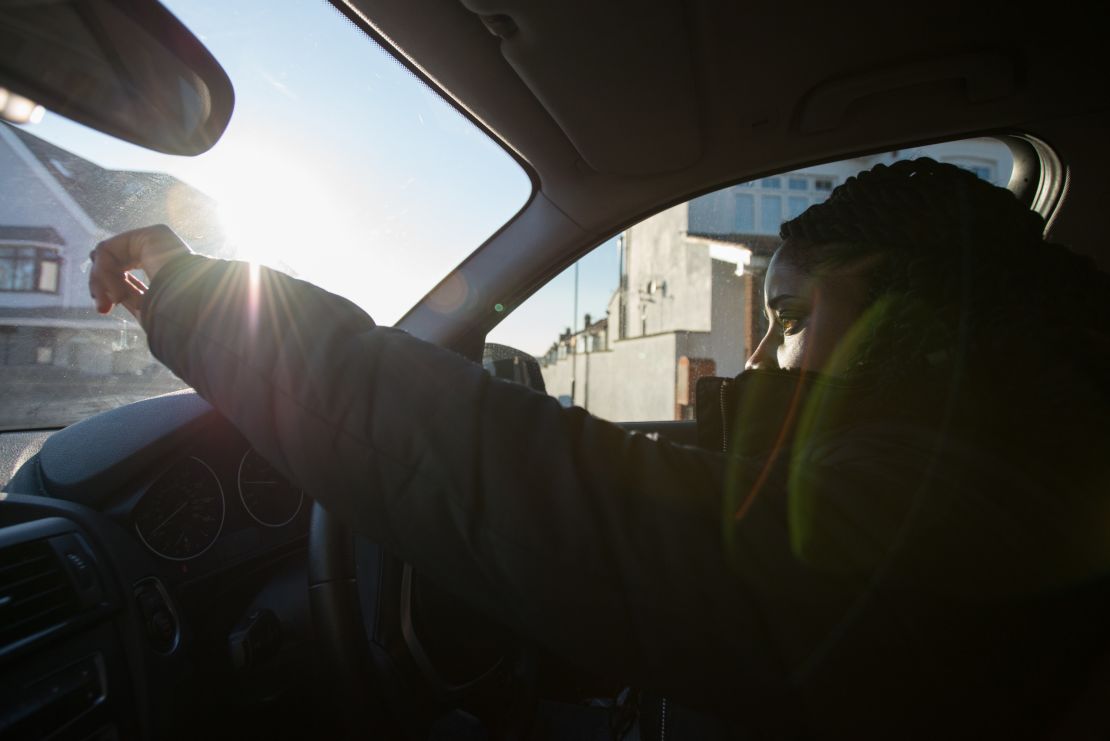
It’s a scene that’s become all too familiar in London, where knife crime is soaring, mostly among young men and boys, some of them incredibly young.
Among just two of the many recent incidents: a 14-year-old boy was left in a critical condition after being stabbed in the stomach by an 11-year-old in July, according to reports. And in the east London borough of Newham, two boys, aged 16 and 13, were convicted of grievous bodily harm for stabbing another 13-year-old boy in September.
From June 2017 to June 2018, the latest period for which figures exist, the Office of National Statistics (ONS) recorded nearly 40,000 knife or sharp instrument crime offenses. This was the highest in the eight years for which data is available, and a 12% increase over 12 months. Despite the rise, these specific crimes are relatively rare, when compared to the frequency of other violent attacks, according to the ONS.
And in February this year, London’s monthly homicide rate briefly overtook New York’s for the first time in history. The ONS report says homicides in London rose 14% in the 12 months to June 2018. This year alone, the UK capital has seen 131 murders, police say.
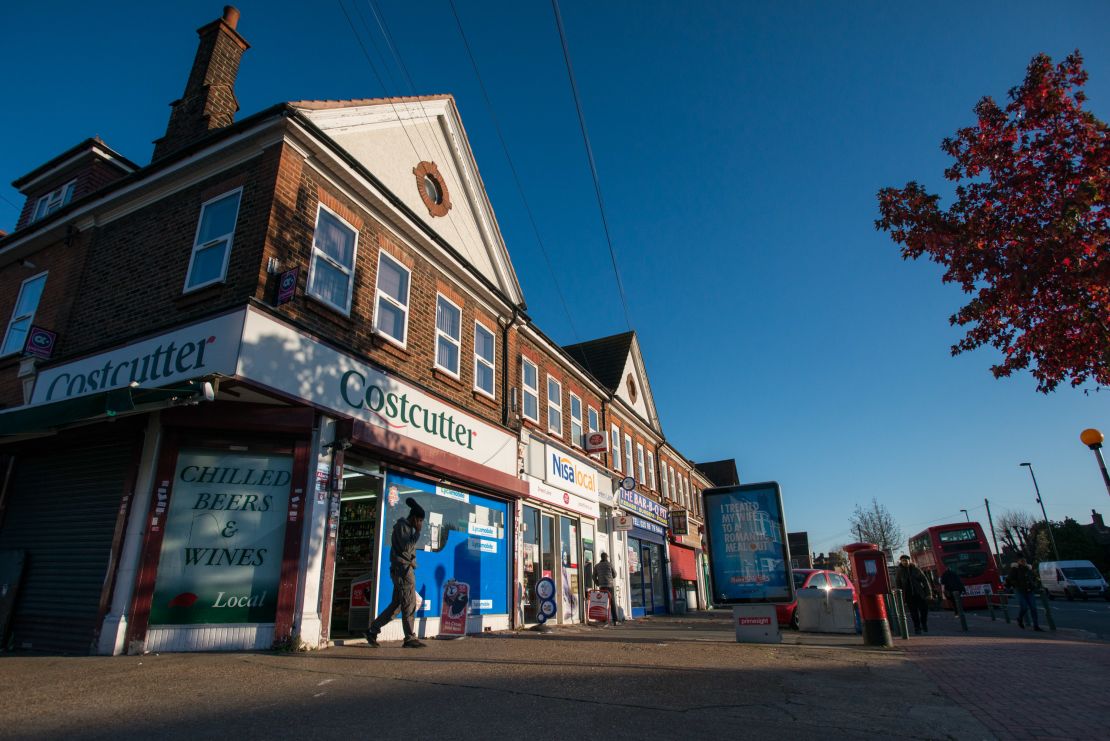
Jermaine’s death, in August last year, was a horrible case of mistaken identity, Goupall said, a view that has been backed by police. Before his death, rival gangs had been wielding knives and threatening to kill each other in drill music videos posted on YouTube, which have since been taken down. The gang members who killed Jermaine thought he was from a rival gang, according to Goupall.
The gang members, masked and armed with knives, approached Jermaine and some friends in a car. His friends managed to hide, but Jermaine tried to run home and was stabbed in the right thigh, an injury from which he died, Goupall said.
In February, three young men, aged 17 to 21, were found guilty of murder, while an 18-year-old woman was also convicted for manslaughter over Jermaine’s death.
One of the rooms in the Goupalls’ home, where Tilisha still lives with her father, has been transformed into a memorial with flowers, candles and photographs of Jermaine.
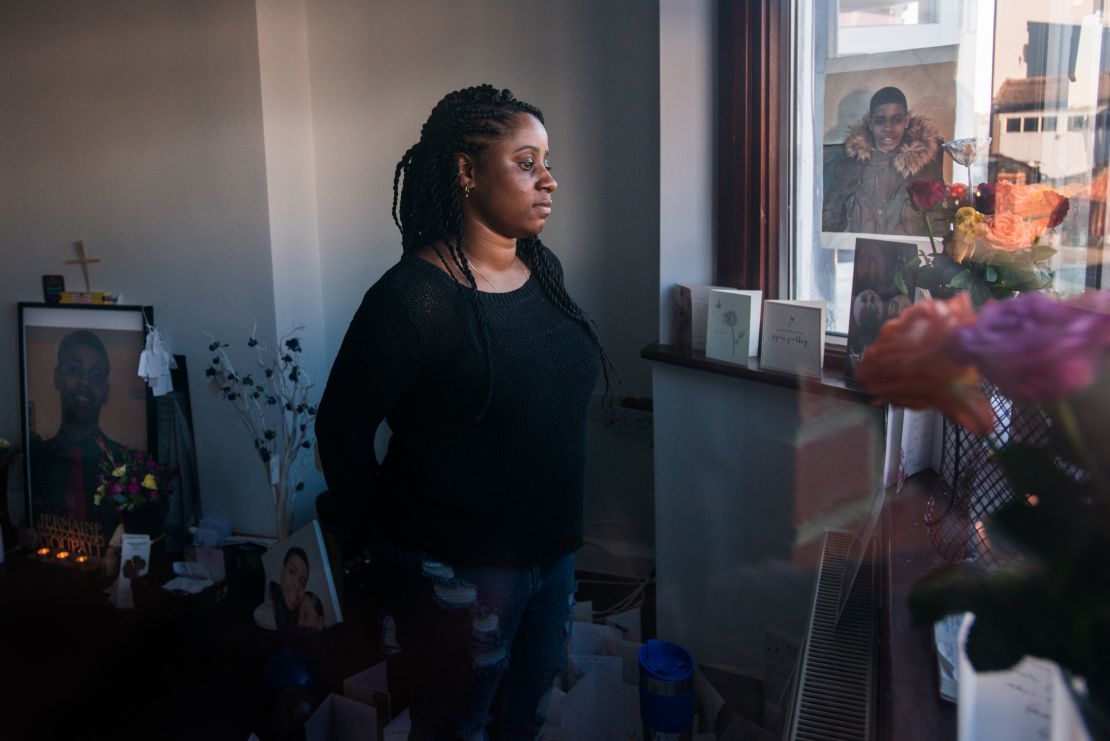
“I miss everything about him. He was a very loving, funny and happy person,” she said, looking at the photographs of her brother.
“It’s hard to look at pictures, but I know what they meant when they were taken. When I watch a video and see him laugh, I cry, thinking, ‘That’s Jermaine – that’s my brother.’”
A lack of opportunity
Data from the Mayor’s Office for Policing and Crime shows knife offenses in London are predominately male-on-male crimes. In 2017, 90% of knife crime offenders were male. Of those crimes that actually caused injury, 78% of victims were male. Of all knife crimes, half were carried out by people under the age of 25.
The report says half of victims and half the offenders in London were from an ethnic minority background.
And according to a report by the UK Parliament, 21% of 21,044 cases of knife possession across the country involved children between the ages of 10 to 17.
At a time when gender roles are rapidly evolving, women and girls have been able to cling onto movements that celebrate that change. Campaigns like #MeToo, for example, have been powerful vehicles for women and girls to challenge gender norms and explore what it means to be female.
But boys and men have not organized in the same way, observes comedian Michael Ian Black, a regular commentator on gender.
“No commensurate movement has emerged to help them navigate toward a full expression of their gender. It’s no longer enough to ‘be a man’ – we no longer even know what that means,” Black wrote in a recent New York Times op-ed “The boys are not all right.”
Arguing that “America’s boys are broken,” he wrote that gun violence in the US is more to do with boys being left behind than a lack of gun control.
The same could be said about the United Kingdom’s broken boys, only here, knives are much easier to acquire than guns.
One problem is that boys with special needs are sinking in the country’s public education system. Years of austerity that has significantly cut funds to youth services hasn’t helped either.
A joint study published this year by the UK’s Ministry of Justice and Department of Education found that 40% of 10 to 18 year olds who’d carried out knife possession offenses had special educational needs during the 2012/13 academic year. Some 83% were persistently absent from school in at least one of the five academic years from 2008/09 to 2012/13 and, of that number, 21% had been permanently excluded.
An investigation by the UK’s Times found that nearly 9,000 academically troubled pupils were intentionally excluded from school in the last three years and put into pupil referral units – specialist schools for troubled students – months before nationwide exams to boost schools’ pass rates.
Boys in these units are a prime target for gangs to recruit, according to Kieran Mitton from King’s College London, who is researching masculinity and gangs in London.
“They get them when they’re young at an age when they’re easily impressed by a small amount of money or seeing weapons,” he said.
“It’s a lot easier for drugs to be carried by children because if they are caught they can’t do the same kind of jail time than if they were over a certain age.”
Mitton, who has studied gangs in several countries, said troubled boys and young men without fathers in their lives are at particular risk of committing crimes. Even in homes where fathers are present, if there is financial strain, a father may spend little time at home. Gang members can provide a “sense of belonging or affection” for a boy to fill the void.
“The boy craves self worth and respect and, by carrying out an act of violence for these men, they get a certain rating within the social pecking order for those guys.”
‘We get bored so we end up doing stupid things’
On a YouTube youth educational show called “Soapbox Real Talking Inspiration,” host Paul McKenzie spoke to several teenage boys hanging out at a park in Enfield, north London, about gang life.
One 14-year-old boy, who is not identified, says he carries a 15-inch knife for “safety.”
“I don’t want someone pulling up on me trying to kill me, so I’ll kill him – I don’t want to die,” he says.
The boy adds that he knows the damage his knife can do, but he doesn’t care because, “It’s big and it’ll get them scared.”
But he acknowledges that in many ways boys causing trouble on the streets are bored. He complains there’s often nothing to do, with no more youth clubs in the area.
“See, right now we’ve got holidays – one week off school. They could do activities like play football or something,” he said.
“But look at the park: no one is in here, it’s just us – we get bored so we end up doing stupid things for fun.”
Research by the YMCA found that spending on youth services across the UK had decreased by £736 million ($939 million) between 2010 to 2017, with London taking 59% of cuts since 2010/11. And between 2011 to 2018, at least 800 youth workers had lost their full-time job, according to a paper by Sian Berry, co-leader of the UK Green Party.
Austerity has also affected police numbers. Prime Minister Theresa May has faced criticism for cutting 20,000 police positions during her time as Home Secretary during the Cameron government. According to a parliamentary report, police numbers have declined 12.8% between 2010 and this year. The government says the cuts were necessary to help dig the UK out of debt.
London Mayor Sadiq Khan is also coming under pressure to do more about knife crime. Last year, Khan told CNN’s Amanpour that London was the “safest global city in the world,” but he recently admitted to the BBC that solving knife crime could take “a generation.”
CNN asked the Mayor’s Office for Policing and Crime why, despite pouring tens of millions of pounds into crime prevention, knife crime has risen. In a statement, the office responded by recognizing the crime rate was high but also blaming the UK government’s cuts to police and youth services for the crisis.
Learning to be a man
Recognizing the impact a lack of youth centers has had on males and how they can be susceptible to crime, Manhood Academy holds regular workshops for boys aged 8 to 12. The boys learn how to communicate with each other and channel their feelings in a positive way to help them to become mature young men.
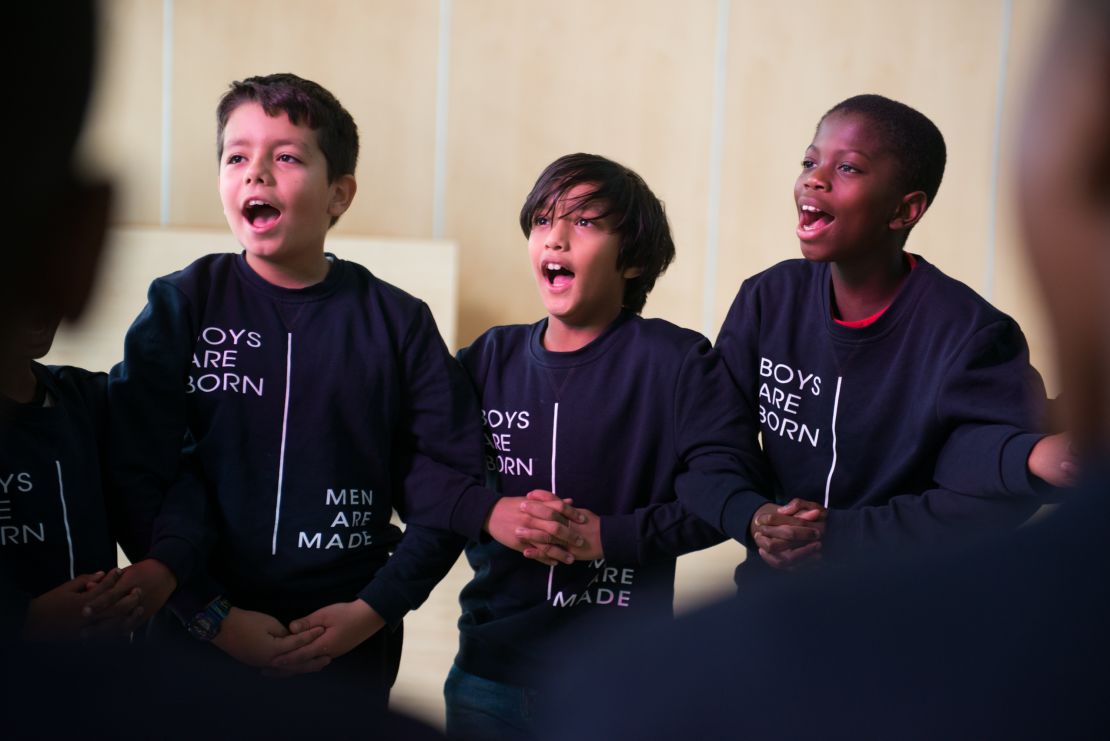
At the academy in Haringey, north London, the chatter and giggles of young boys can be heard as they storm into the classroom, eager to start their session. In one exercise to teach the boys about resisting peer pressure, a boy is asked to stand in front of line as the others egg him on to step over it. Despite all the shouting, the young boy refuses, stamps his foot and says “No!”
Many of the boys are raised by a single parent, some of them with one parent in prison. They are referred to the program by schools, parents or guardians who see them as at risk.
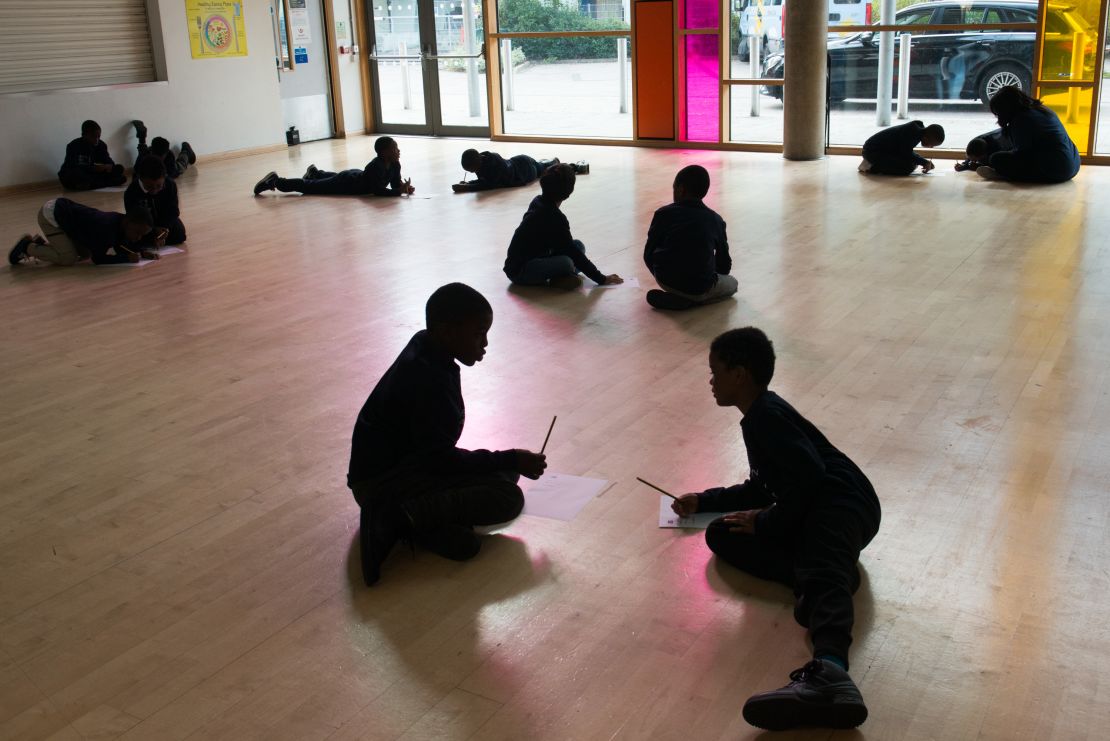
Jermaine Freeman, 22, was mentored at the academy and is now himself a mentor. He says if it weren’t for the academy, he would have ended up “dead or in jail.”
Growing up in Harlesden, northwest London, Freeman’s mother died in 2016 of illness. He never had a relationship with his father. When he was a youth, he says a gang groomed him into selling drugs.
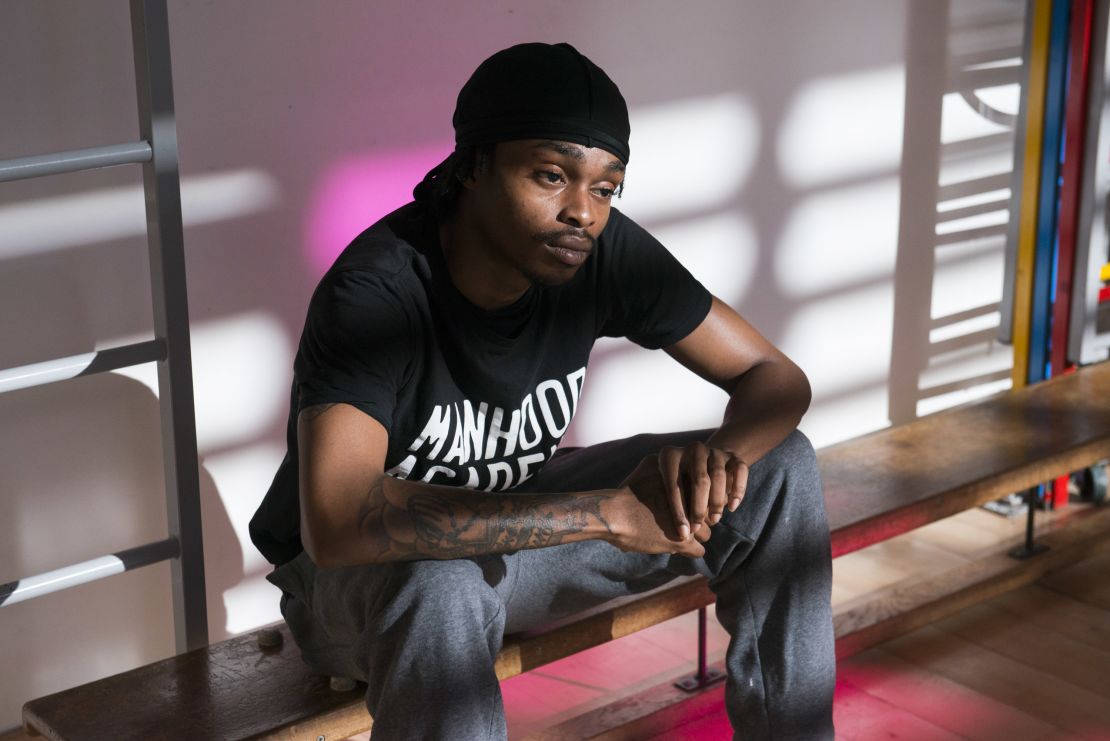
He may still be young, but in the gang he quickly became an “older” – someone a younger person looks up to – to lure children into criminal activity. Freeman ran into trouble at school when he was caught with cocaine in his possession, which his own older expected him to sell to his peers.
“I was unhappy, unsatisfied and confused. I felt as though I had no choice but to join them,” he told CNN. “I looked up to these guys and they took advantage of my circumstances. You were either with them or against them and I had to accept that.”
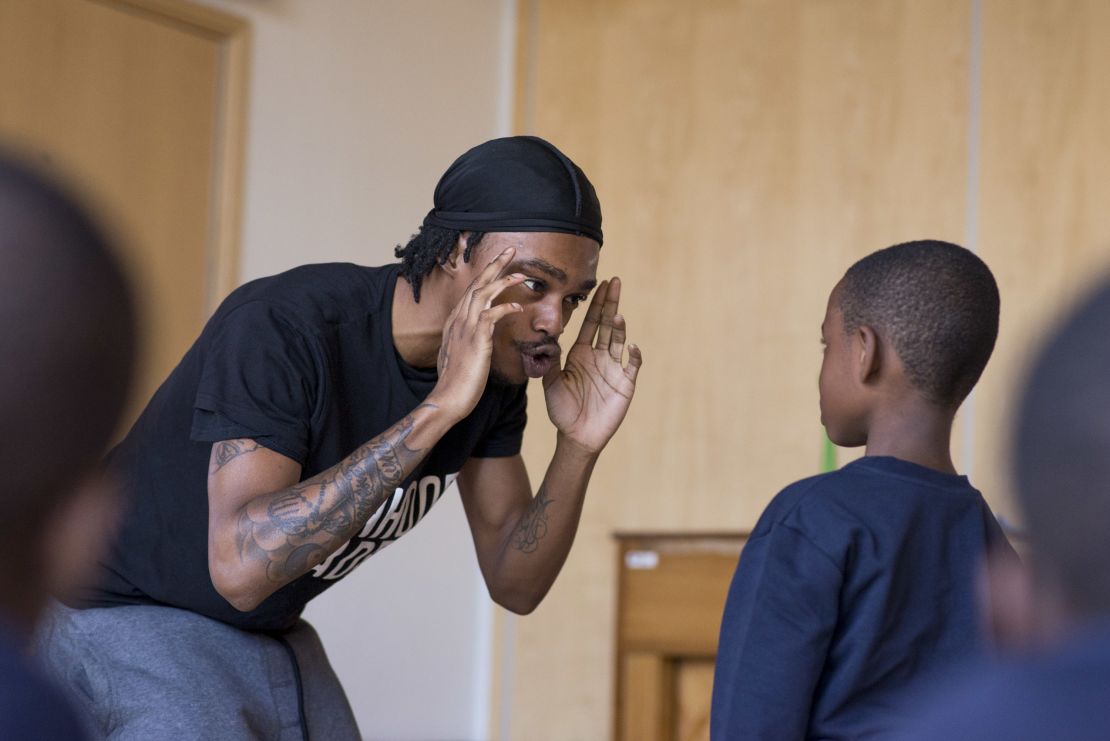
Having put his life of crime behind him, Freeman is now focusing on acting and has had success starring as an extra in the movie “Yardie,” directed by actor Idris Elba.
In November, Freeman completed a three-week-long performance for a lead role in “Guilt Trip,” a play that puts a modern twist on Shakespeare’s “Much Ado About Nothing.”
“When I started loving myself I found out what I was capable of. I can dance, act and rap – I’m not just any other youth in London,” he said.

“I could have been like those guys standing at the bus stop right now selling drugs and have been a product of my environment,” he said.
“But I’m not because now, I’m on another path and I’m not going to give up on myself.”
